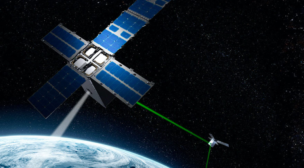The Moonlighter satellite successfully completed its first act as a “hacking sandbox” during a competition to discover cyber vulnerabilities in orbit—but the spacecraft’s mission is far from over, officials said.
Moonlighter 101: The spacecraft, which is a joint project from the Aerospace Corporation, Space Systems Command, and the Air Force Research Laboratory, launched in June and deployed to LEO from the ISS the following month to be ready this month for Hack-A-Sat 4, which is a Capture-the-Flag style cyber competition in space.
The competition: Teams competed on a number of challenges targeting both ground systems and space assets. In one space-based challenge, teams competed to break into the satellite to get access to locked scripts, Aaron Myrick, a senior project engineer at the Aerospace Corporation, told Payload. In another, which no team was able to solve, teams were tasked with pointing the spacecraft at a specific target and snapping a picture.
Winner, winners: Five finalist teams were able to operate on Moonlighter, but there could only be one winner. mHACKeroni, a team from Italy, was the overall winner, followed by Poland Can Into Space (last year’s winning team, which included participants from Poland, Germany, and Ireland) in second, and jmp fs: [rcx] from the US and UK in third.
But it’s not all underground cyber sleuths. Northrop Grumman has a team in the competition this year, Myrick said, adding that at least five mainstream companies approached him at Space Symposium this year inquiring about fielding a team.
What’s next? Hack-a-Sat may be over, but Moonlighter’s mission isn’t. Myrick said he’s planning to work with companies and government agencies to “really put it through the gamut testing technology” in orbit that has previously only been tried out in laboratory or simulation environments.
“To have a vehicle where we can try out these technologies, and try out different tactics, techniques, and procedures that have been developed during the years in a live environment is an incredible perspective,” he said. “It’s never good enough to do it in a sim environment.”




